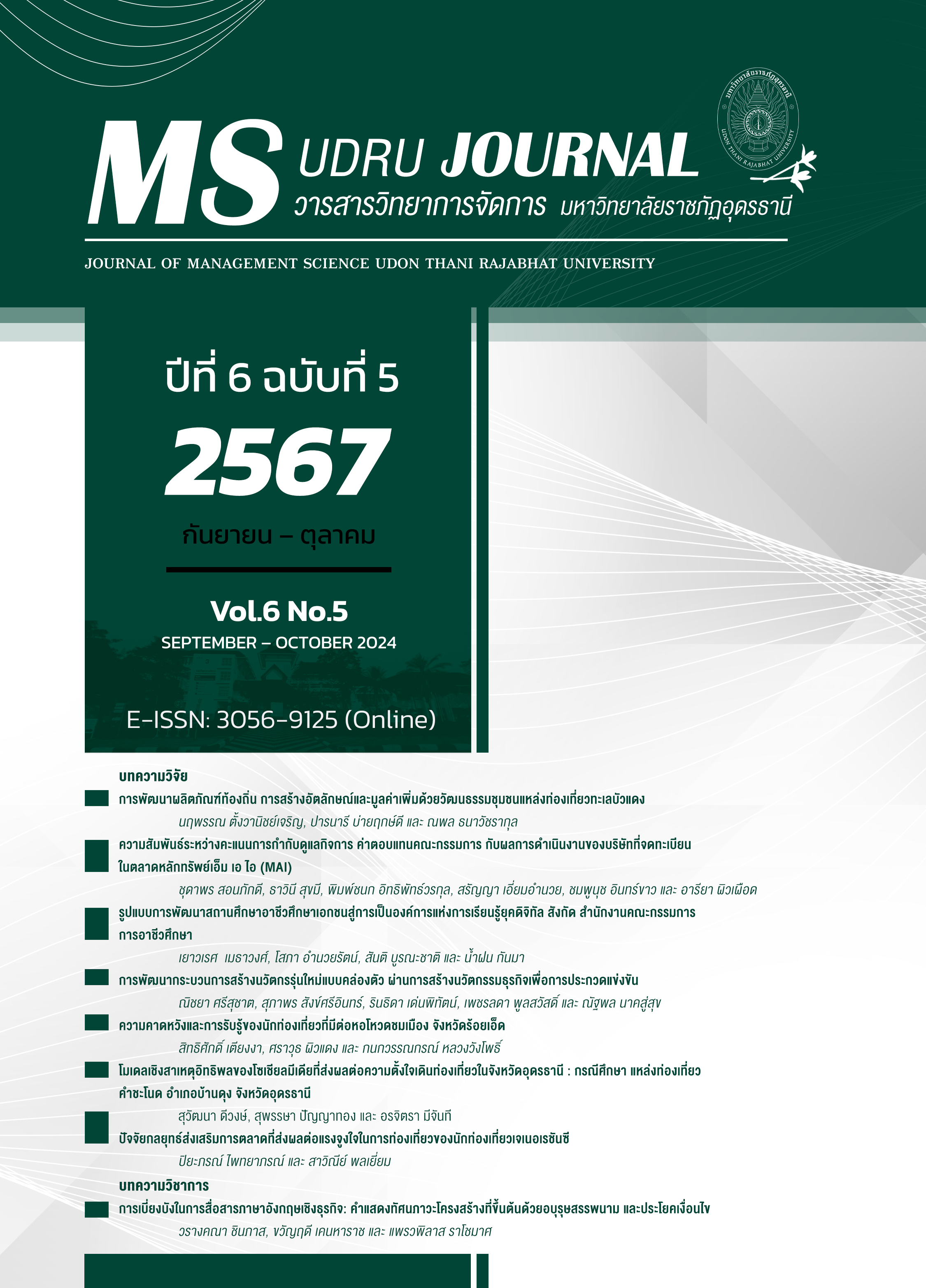รูปแบบการพัฒนาสถานศึกษาอาชีวศึกษาเอกชนสู่การเป็นองค์การแห่งการเรียนรู้ยุคดิจิทัล สังกัด สำนักงานคณะกรรมการการอาชีวศึกษา
Main Article Content
บทคัดย่อ
การวิจัยครั้งนี้มีวัตถุประสงค์เพื่อ 1) สร้างรูปแบบการพัฒนาสถานศึกษาอาชีวศึกษาเอกชนสู่การเป็นองค์การแห่งการเรียนรู้ยุคดิจิทัล สังกัดสำนักงานคณะกรรมการการอาชีวศึกษา 2) ประเมินรูปแบบการพัฒนาสถานศึกษาอาชีวศึกษาเอกชนสู่การเป็นองค์การแห่งการเรียนรู้ยุคดิจิทัล สังกัดสำนักงานคณะกรรมการการอาชีวศึกษา กลุ่มตัวอย่างที่ใช้ในการวิจัย ได้แก่ ผู้บริหารสถานศึกษาอาชีวศึกษาเอกชน กลุ่มภาคเหนือ จำนวน 43 คน เครื่องมือที่ใช้ในการวิจัยเป็นแบบสอบถามถึงความเหมาะสมและแบบประเมินความเป็นไปได้ และความเป็นประโยชน์ของรูปแบบการพัฒนาสถานศึกษาอาชีวศึกษาเอกชนสู่การเป็นองค์การแห่งการเรียนรู้ยุคดิจิทัล สังกัดสำนักงานคณะกรรมการการอาชีวศึกษา สถิติที่ใช้ในการวิเคราะห์ข้อมูล ได้แก่ ร้อยละ ค่าเฉลี่ย ส่วนเบี่ยงเบนมาตรฐาน การวิเคราะห์องค์ประกอบเชิงยืนยัน (CFA) และการวิเคราะห์เนื้อหา (Content Analysis) โดยการวิเคราะห์เนื้อหาแนวทางการพัฒนาภาวะผู้นำเชิงนวัตกรรมของผู้บริหารสถานศึกษา โดยการสัมภาษณ์ผู้ทรงคุณวุฒิ 18 ท่าน
ผลการวิจัยพบว่า
- ผู้บริหารสถานศึกษามีความคิดเห็นเกี่ยวกับความเป็นไปได้ของรูปแบบการพัฒนาสถานศึกษาอาชีวศึกษาเอกชนสู่การเป็นองค์การแห่งการเรียนรู้ยุคดิจิทัล สังกัดสำนักงานคณะกรรมการการอาชีวศึกษา ภาพรวมอยู่ในระดับมากที่สุด เมื่อจำแนกเป็นรายส่วน พบว่า ทุกส่วนมีความเป็นไปได้ของรูปแบบอยู่ในระดับมากที่สุด โดยส่วนที่ 1 องค์ประกอบรูปแบบการพัฒนาสถานศึกษาอาชีวศึกษาเอกชนสู่การเป็นองค์การแห่งการเรียนรู้ยุคดิจิทัล มีความเป็นไปได้ของรูปแบบที่มีค่าเฉลี่ยมากที่สุด รองลงมาเป็นส่วนที่ 3 กระบวนการพัฒนาสถานศึกษาอาชีวศึกษาเอกชนสู่การเป็นองค์การแห่งการเรียนรู้ยุคดิจิทัล ตามกระบวนการ (POLC) และความเป็นไปได้ของรูปแบบที่มีค่าเฉลี่ยน้อยที่สุด คือ ส่วนที่ 2 แนวทางการพัฒนาสถานศึกษาอาชีวศึกษาเอกชนสู่การเป็นองค์การแห่งการเรียนรู้ยุคดิจิทัล เมื่อพิจารณาเป็นรายข้อพบว่า ความเป็นไปได้ของรูปแบบข้อที่มีค่าเฉลี่ยมากที่สุด คือ องค์ประกอบการพัฒนาสถานศึกษาอาชีวศึกษาเอกชนสู่การเป็นองค์การแห่งการเรียนรู้ยุคดิจิทัล โดยองค์ประกอบด้านที่มีค่าเฉลี่ยมากที่สุด คือ ด้านบุคคลแห่งการรอบรู้ รองลงมาเป็นด้านการมีวิสัยทัศน์ร่วม รองลงมาเป็นด้านแบบแผนความคิด รองลงมาเป็นด้านการเรียนรู้ร่วมกันเป็นทีม และองค์ประกอบด้านที่มีค่าเฉลี่ยน้อยที่สุด คือ ด้านการคิดอย่างเป็นระบบ ตามลำดับ กระบวนการในการพัฒนาสถานศึกษาอาชีวศึกษาเอกชนสู่การเป็นองค์การแห่งการเรียนรู้ยุคดิจิทัล สังกัดสำนักงานคณะกรรมการการอาชีวศึกษา ด้วยกระบวนการ POLC มีปัจจัยที่สำคัญ 3 ประการ ดังนี้ 1. การเรียนรู้จากคำวิจารณ์ผู้บริหารสถานศึกษาสามารถนำความคิดในการพัฒนาศักยภาพของตนเองได้ มีความพยายามในการพัฒนาสถานศึกษาให้เป็นองค์การแห่งการเรียนรู้ 2. การหาแรงบันดาลใจจากความสำเร็จของผู้บริหารสถานศึกษาอาชีวศึกษาเอกชนอื่นทั้งภาครัฐและเอกชนที่พัฒนาสถานศึกษาให้เป็นองค์การแห่งการเรียนรู้ได้สำเร็จ 3. การถ่ายทอดความรู้ทั่วทั้งองค์กรได้อย่างรวดเร็วและมีประสิทธิภาพ โดยมีการนำเทคโนโลยีสมัยใหม่มาใช้ในการสนับสนุนการแสวงหาความรู้ และกระจายองค์ความรู้ต่าง ๆ ระหว่างบุคลากร ทีมงานภายในสถานศึกษา และเครือข่ายสถานศึกษาอาชีวศึกษา ตามลำดับ
- ในส่วนของความเป็นประโยชน์ของรูปแบบการพัฒนาสถานศึกษาอาชีวศึกษาเอกชนสู่การเป็นองค์การแห่งการเรียนรู้ยุคดิจิทัล สังกัดสำนักงานคณะกรรมการการอาชีวศึกษา ภาพรวมอยู่ในระดับมากที่สุด เมื่อจำแนกเป็นรายส่วน พบว่า ทุกส่วนมีความเป็นประโยชน์ของรูปแบบอยู่ในระดับมากที่สุด โดยส่วนที่ 1 องค์ประกอบองค์การแห่งการเรียนรู้ยุคดิจิทัล มีความเป็นประโยชน์ของรูปแบบที่มีค่าเฉลี่ยมากที่สุด รองลงมาเป็นส่วนที่ 2 แนวทางรูปแบบการพัฒนาสถานศึกษาอาชีวศึกษาเอกชนสู่การเป็นองค์การแห่งการเรียนรู้ยุคดิจิทัล และความเป็นประโยชน์ของรูปแบบที่มีค่าเฉลี่ยน้อยที่สุด คือ ส่วนที่ 3 กระบวนการพัฒนาสถานศึกษาอาชีวศึกษาเอกชนสู่การเป็นองค์การแห่งการเรียนรู้ยุคดิจิทัล ตามหลักกระบวนการ (POLC) เมื่อพิจารณาเป็นรายข้อพบว่า ความเป็นประโยชน์ของรูปแบบข้อที่มีค่าเฉลี่ยมากที่สุด คือ วิธีการพัฒนาสถานศึกษาอาชีวศึกษาเอกชนสู่การเป็นองค์การแห่งการเรียนรู้ยุคดิจิทัล ด้วยกระบวนการ POLC มีปัจจัยที่สำคัญ 3 กระการ ดังนี้ 1. การเรียนรู้จากคำวิจารณ์ผู้บริหารสถานศึกษาสามารถนำความคิดในการพัฒนาศักยภาพของตนเองได้ มีความพยายามในการพัฒนาสถานศึกษาให้เป็นองค์การแห่งการเรียนรู้ 2. การหาแรงบันดาลใจจากความสำเร็จของผู้บริหารสถานศึกษาอาชีวศึกษาเอกชนอื่นทั้งภาครัฐและเอกชนที่พัฒนาสถานศึกษาให้เป็นองค์การแห่งการเรียนรู้ได้สำเร็จ 3. การถ่ายทอดความรู้ทั่วทั้งองค์กรได้อย่างรวดเร็วและมีประสิทธิภาพ โดยมีการนำเทคโนโลยีสมัยใหม่มาใช้ในการสนับสนุนการแสวงหาความรู้ และกระจายองค์ความรู้ต่าง ๆ ระหว่างบุคลากร ทีมงานภายในสถานศึกษา และเครือข่ายสถานศึกษาอาชีวศึกษาตามลำดับ
Article Details

อนุญาตภายใต้เงื่อนไข Creative Commons Attribution-NonCommercial-NoDerivatives 4.0 International License.
บทความที่ได้รับการตีพิมพ์เป็นลิขสิทธิ์ของคณะวิทยาการจัดการ มหาวิทยาลัยราชภัฏอุดรธานี
ข้อความที่ปรากฏในบทความแต่ละเรื่องในวารสารวิชาการเล่มนี้
ไม่ใช่ความคิดเห็นและความรับผิดชอบของผู้จัดทำ บรรณาธิการ กองบรรณาธิการ และคณะวิทยาการจัดการ มหาวิทยาลัยราชภัฏอุดรธานี ความรับผิดชอบด้านเนื้อหาและการตรวจร่างบทความแต่ละเรื่องเป็นความคิดเห็นของผู้เขียนบทความแต่ละท่าน
เอกสารอ้างอิง
กฤษณะ ดาราเรือง. (2558). ตัวแบบองค์การแห่งการเรียนรู้ และการจัดการความรู้ สู่การเป็นองค์การแห่งการเรียนรู้. วารสารวิชาการ สมาคมสถาบันอุดมศึกษาเอกชนแห่งประเทศไทย ในพระราชูปถัมภ์สมเด็จพระเทพรัตนราชสุดาฯ สยามบรมราชกุมารี, 21(2), 133-145.
ไชยสิทธิ์ ปิยมาตย์. (2556). ปัจจัยที่ส่งผลต่อการเป็นองค์การแห่งการเรียนรู้ของโรงเรียนเหล่าสายวิทยาการของกองทัพบก. วิทยานิพนธ์ปริญญาปรัชญาดุษฎีบัณฑิต, มหาวิทยาลัยศรีปทุม.
ณัฎฐ์ โอ้จินดา. (2563). การพัฒนารูปแบบองค์การแห่งการเรียนรู้ในศตวรรษที่ 21 สำหรับสถานศึกษาขนาดเล็ก ในสำนักงานศึกษาธิการภาค 13. วิทยานิพนธ์ปริญญาดุษฎีบัณฑิต, มหาวิทยาลัยราชภัฏบุรีรัมย์.
ธัญญาภรณ์ นาจำปา. (2564). การพัฒนารูปแบบการบริหารสถานศึกษาในยุคดิจิทัล สำหรับโรงเรียนมัธยมศึกษาในเขตภาคกลาง สังกัดสำนักงานคณะกรรมการการศึกษาขั้นพื้นฐาน. ปริญญานิพนธ์ปริญญาการศึกษาดุษฎีบัณฑิต, มหาวิทยาลัยศรีนครินทรวิโรฒ.
นิสรา ใจซื่อ. (2564). แนวทางการพัฒนาองค์การแห่งการเรียนรู้เพื่อพร้อมรับความเปลี่ยนแปลง. วารสารการบริหารและสังคมศาสตร์ปริทัศน์, 4(4), 126-135.
ปุณณิฐฐา มาเชค. (2565). การบริหารองค์กรทางการศึกษาในยุคดิจิทัล. https://ed-adm.buu.ac.th/public/backend/upload/ed-adm.buu.ac.th/document/file/document166623381159360600.pdf.
พะโยม ชิณวงศ์ และ ศิริชัย ชินะตังกูร. (2556). รูปแบบการเป็นองค์การแห่งการเรียนรู้ของสถานศึกษาเฉพาะความพิการสำหรับเด็กหูหนวก. วารสารศิลปากรศึกษาศาสตร์วิจัย, 5(2), 73-85.
รณกร ประทุมเกษร์. (2561). ปัจจัยขององค์การนวัตกรรมและองค์การแห่งการเรียนรู้ที่มีอิทธิพลต่อประสิทธิภาพการทำงานตามสมรรถนะหลักของพนักงาน: กรณีศึกษา บริษัทหลักทรัพย์จัดการกองทุน จำกัด. การค้นคว้าอิสระปริญญาบริหารธุรกิจมหาบัณฑิต, มหาวิทยาลัยธรรมศาสตร์.
วัฒนสิน บุสดี, สุรชัย สิชาบัณฑิต และ ปัทมา รูปสุวรรณกุล. (2558). การพัฒนารูปแบบองค์กรแห่งการเรียนรู้. วารสารวิชาการอุตสาหกรรมศึกษา คณะศึกษาศาสตร์ มหาวิทยาลัยศรีนครินทรวิโรฒ, 9(2), 52-62.
อัญชลี เหลืองศรีชัย และลัดดาวัลย์ เพชรโรจน์. (2564). การเป็นองค์กรแห่งการเรียนรู้ในยุคดิจิทัลตามความคิดเห็นของบุคคล ในสังกัดอาชีวศึกษาจังหวัดปทุมธานี. วารสารมนุษยศาสตร์และสังคมศาสตร์ มหาวิทยาลัยราชพฤกษ์, 7(2), 170-186.
Akour, M.; Alenezi, M. (2022). Higher Education Future in the Era of Digital Transformation. Educ. Sci., 12, 784. https://doi.org/10.3390/educsci12110784.
Alfaro-Ponce, Berenice & Alfaro Ponce, Mariel & Muñoz-Ibáñez, Cristopher & Gonzalez, Duran & Sanabria-Zepeda, Jorge & González-Gómez, Zaira. (2023). Education in Mexico and technological public policy for developing complex thinking in the digital era: A model for technology management. Journal of Innovation & Knowledge, 8, 100439. 10.1016/j.jik.2023.100439.
Botha, D. C. (2019). The management of professional development of teachers in secondarySchools. [Master Dissertation, University of Pretoria]. http://hdl.handle.net/2263/71747.
Eisner, E. (1976). Education Connoisseurship and Criticism: Their Form and Function in Education Evaluation. Journal of Aesthetic Education, 10(3), 192-193.
Fischer, G., Lundin, J. and Lindberg, O.J. (2023), The challenge for the digital age: making learning a part of life. International Journal of Information and Learning Technology, 40(1), 1-16. from https://doi.org/10.1108/IJILT-04-2022-0079.
Guinan, Patricia & Parise, Salvatore & Langowitz, Nan. (2019). Creating an innovative digital project team: Levers to enable digital transformation. Business Horizons. 62. 10.1016/j.bushor.2019.07.005.
Hiremath, N.V., Mohapatra, A.K. and Paila, A.S. (2021), A study on digital learning, learning and development interventions and learnability of working executives in corporates, American Journal of Business, 36(1), 35-61. from https://doi.org/10.1108/AJB-09-2020-0141.
Patmanthara, Syaad & Hidayat, Wahyu Nur. (2018). Improving Vocational High School Students Digital Literacy Skill through Blended Learning Model. Journal of Physics: Conference Series. 1028. 012076. 10.1088/1742-6596/1028/1/012076.
Robbins, S. P. (1996). The Administrative Process. USA: Prentice-Hall.
Stanganelli, L., Coccoli, M., & Maresca, P. (2014). Smarter universities: A vision for the fast-changing digital era. Journal of Visual Languages & Computing. 25. 1003-1011. 10.1016/j.jvlc.2014.09.007.
Straughan, P. T., Tay, W, Song, E & Koh-Tan, A. (2018). Assessing Student Learning in Sport Event Management through Reflective Practice: Measures of Success in Co-curricular Learning in Higher Education. In D. Wache and D. Houston (Eds.), Research and Development in Higher Education: (Re) Valuing Higher Education, 41 (pp 123 - 142). Adelaide, Australia, 2-5 July 2018.


